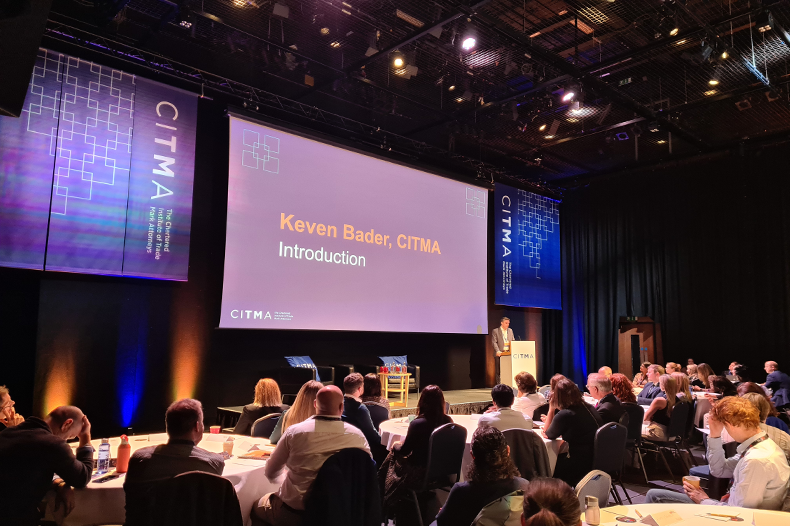Autumn Conference 2022: Key takeaways
The future of intellectual property, including key questions on NFTs, was a core focus for delegates at our Autumn Conference in Birmingham.

Our Autumn Conference in Birmingham brought together a line-up of inspiring speakers from our industry and beyond.
Survey evidence
Jonathan Moss highlighted in his roundup of UK cases the increasing tendency for the UK IPO to strike out bad faith claims.
“The UK IPO has been much stricter in my experience in not allowing bad faith applications to go ahead,” Jonathan told delegates.
In addition to this, referencing the Lidl v Tesco case [2022 EWHC 1434 (Ch)], Jonathan suggested that “survey evidence is becoming more prominent again”, this follows the Interflora case where he felt that we may have “gone too far the other way” in not using survey evidence.
“Now for the right case, this being one of them, survey evidence is becoming more admissible,” he added.
Iceland v Iceland
Sally Britton, who was directly involved in the Iceland case that went to an oral hearing before the EUIPO Grand Board recently gave delegates a unique insight into what was involved in the proceedings.
This was the first ever oral hearing held by the EUIPO’s Grand Board.
Sally described the pathway that took the case there and what Sally and her team did to prepare, what they did on the day and what the next steps are.
Good practice in opposition, invalidity and revocation proceedings
The UK IPO’s Heather Harrison offered our delegates some insider tips on how trade mark attorneys can best work with the Office.
She noted that the “level of professional and competence” that the UK IPO sees from trade mark attorneys “continues to rise” – a testament to the hard work that our members put in to representing their clients in front of the UK IPO.
Heather identified some pitfalls, including:
- Not reviewing pleadings in advance of final submissions. Reviewing your pleadings allows you plug the gaps early, and to be discerning in terms of what evidence needs to be included
- Not keeping to the 300 page submission length limit. Submissions which are longer than this are likely to become repetitive or to include long lists of marks which are rarely helpful outside of bad faith oppositions.
- Applying for confidentiality without good reason specific to your case. In particular, the suggestion that the case is commercially sensitive is not a strong enough reason.
Promoting greater support for paralegals and access to the profession
Kane Ridley and Carol Nyahasha sat with Kelly Saliger to share their wisdom on the changing nature of the paralegal profession, and to consider how our industry can support paralegals.
They identified that, increasingly, being a paralegal constitutes an interesting, varied and successful career in its own right – it should not be seen as a stepping stone to becoming a Chartered Trade Mark Attorney.
Carol commented that mentoring is a particularly valuable way to support paralegal careers, and that she herself had been happiest as a paralegal at firms which invested in growth and development.
Kane acknowledged the important mentoring that Roy Scott offered him at Keltie, and agreed that mentoring can allow people to see a clear career trajectory.
Carol identified that the mentoring process is not one way – as a senior trade mark professional, her work as a mentor allows her to “hold a mirror up” to herself.
Anti-counterfeiting and geopolitics
Tom Nener pointed out three key global events have been providing increasing opportunities for counterfeiters:
- U.S. and China trade war
- Coronavirus pandemic
- Russia and Ukraine conflict
Tom said that it was too early to really understand the impact of the Russia and Ukraine conflict. However, “we have already seen a spike in counterfeits of certain products such as cooking oil,” he noted.
Security interests over trade marks and related transactions
Mei Mei Wong, who has a background in finance law, took us through the crossovers between financial transactions and trade marks,
She also identified the types of security and security packages which may be created over registered and unregistered trade marks.
She explored the three most common types of security created in relation to trade marks and the steps that might be taken under each one:
- Mortgage: the taking of a title upon taking security,
- Fixed charge: creation of encumbrance upon taking security,
- floating charge: the appointment of an administrator
Mei Mei then shared the key risks which practitioners must be aware of in order to come as close as possible to perfect security interests.
NFTs
Alex Watt helped delegates in better understand how NFTs will affect IP practice going forwards.
He noted some interesting trends, giving the Museum of Modern Art (MoMA) in New York as an example, which is selling a Picasso to invest in NFTs.
Alex invited delegates to discuss a series of questions which helped us to share views on this emerging, and often complex, area of practice.

